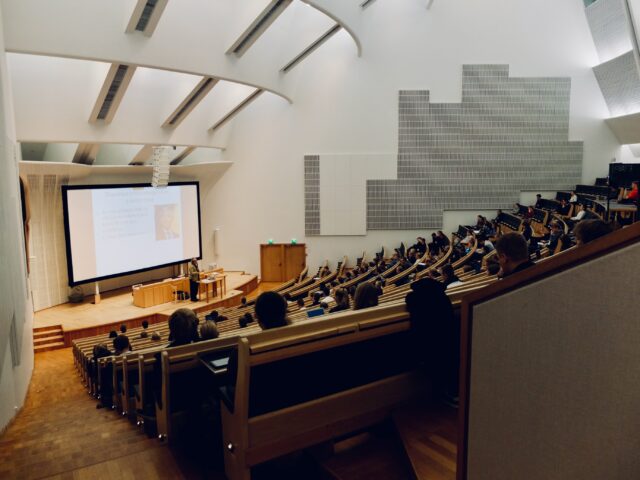Centennial College has partnered with Tropicana Community Services to launch the Early Childhood Education – Tropicana Black Fast-track program. The fully-funded program will support Black, African, and Caribbean students who want to pursue early childhood education by giving them the opportunity to study in a culturally affirming environment with reduced financial barriers. The program includes three field placements where students will work directly with children, as well as the opportunity to work in a full-day kindergarten environment during their third or fourth semesters. “Coinciding with Black History Month, we’re launching the academic upgrading component of our ECE program for Black learners right now,” said Centennial Chair of Child and Family Studies Dr Jaspreet Bal.

Top Ten News
February 10, 2023
After an uproar on social media, Cégep Garneau has announced that it will be reviewing recent materials distributed in a political science course. Materials distributed in the class defined the concepts of political left and right according to six different themes: Human, society, culture, history, economy, and politics. A table in the materials reportedly defined the left as being “altruistic, rational, and a master of the self,” while the right was defined as “selfish, irrational, a slave to impulses and instincts.” The Cégep published a statement on Twitter to assert that the institution does not encourage any particular political affiliation.
The University of Alberta’s Li Ka Shing Institute of Virology has received a $1.5M investment from GSK toward the GSK Chair in Virology. The investment will increase the value of the endowed chair to almost $6M and will be used to support the recruitment of high-quality scientists to future LKSloV leadership roles and help create jobs in the industry. “Industry funding allows us to take substances that are discovered at universities to a product that can be sold in a pharmacy for patients to access,” said GSK Chair in Virology Dr Lorne Tyrell.
Trent University is launching a Master of Arts in Interdisciplinary Aging Studies program. The program will teach practical approaches to aging-related challenges as well as how to analyze issues around contemporary aging. Students will have the opportunity to complete an experiential learning placement. “We are excited to have a new program for graduate students interested in studying aging from perspectives across the humanities, social sciences, and sciences,” said Trent Centre for Aging and Society Director Dr Elizabeth Russell. “Communities all over Canada are aging—we’re all aging—and so we must deepen our understanding of the realities of growing older and challenge entrenched ideas about older adults.”
Three colleges have launched dual-credit programs where high school students can experience a college education and earn credits toward their high school diploma. Northern Lakes College is hosting a Junior High welding camp that teaches students about safety, symbols, and gas metal arc welding. Interested students can enrol in the dual credit programs offered by the college and get a head start in the program. Lakeland College has expanded its dual credit offerings with a new automotive service technician course. Students who complete all components successfully will be eligible to write the apprenticeship and industry training exam. Camosun College recently highlighted its partnerships with five school districts to offer dual credit opportunities in areas such as business, health, trades, and technology.
The methods for measuring society impact beyond standard publication metrics are improving, writes Chris Woolston for Nature, but several challenges remain. Woolston speaks to policy researchers in Europe and the UK who emphasize the importance of embracing a broad view of research impact that recognizes scientists for their contributions to society. However, this can only be done with the introduction of a system to measure and track impact in a reliable manner. As Woolston describes the approaches used by organizations to track impact, he highlights examples such as tracking citations in policies, assessing innovation beyond patent counts, and contribution mapping by academic and non-academic staff.
The University of New Brunswick’s department of psychology has launched two new certificates in mental health and wellness. The certificates are designed to teach students about mental illness and psychological health as well as the topics’ relevance to personal and community wellness. The certificates cover health and wellness, psychopathologies and treatments, critical thinking skills, an introduction to counselling techniques, and more. Students who complete both programs will have developed a thorough understanding of mental health that they can apply in their future career paths.
Algoma University and Mattagami First Nation (MFN) recently signed a Memorandum of Understanding to expand Indigenous STEAM community-based education and training opportunities and enhance cross-cultural understanding. The University has partnered with MFN to develop and deliver the Waawaaskonwe – Niigan (There is a Light – Ahead) program, which will give youth from northern communities the opportunity to learn about STEAM through both traditional ways of knowing and western teachings. The MOU will also see AlgomaU’s Anishinaabe Academic Resource Centre offering the Gabegendaadowin Training Program to enhance cross-cultural understanding.
The Athabasca University Faculty Association (AUFA), the Athabasca Students’ Union, and CUPE Local 3911 have issued statements and expressed their disagreement with the recent replacement of former AU President Peter Scott. AUFA is publicly against the change in leadership. AUSU President Karen Fletcher stated that protocols were not followed in the replacement. “I found out that Peter Scott was fired in the same email where I was invited to vote,” said Fletcher. The students’ union stated that student representatives were also excluded from discussion. CUPE Local 3911 defended Scott and described the dismissal was “shocking and disappointing.” Globe and Mail reports that the Government of Alberta Advanced Education Minister Demetrios Nicolaides has dismissed claims of government involvement, stating that he did not indicate that he wanted Scott to be replaced.
Connect with and building relationships with students is essential to engaging them in learning, writes Gretchen McKay. With dropping student engagement, McKay notes how education has become more transactional over time. “With an increasingly businesslike higher education landscape and an emphasis on the ‘return on investment,’” she writes, “students are missing the value of learning, critical thinking and wonder.” The author argues that instructors should refocus on building relationships with their students through three approaches: explaining the “why” behind a course to students, beginning courses with a “mystery box” exercise to help students get to know their instructor, and allowing students to see them as vulnerable in order to demonstrate that failure and difficulty is often part of the journey.
